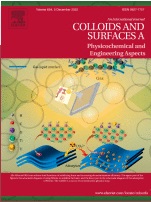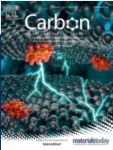Titanium dioxide (TiO
2) is widely used in
photocatalysis applications for
wastewater treatment. Investigations demonstrated that titanium dioxide structure strongly contributes to increase micropollutant degradation efficiency. Indeed,
pollutant degradation rates are enhanced when using
photocatalysts with highly ordered structures and high specific surface area, such as TiO
2 nanotubes (NTs) synthesized by
atomic layer deposition (ALD). Here, TiO
2 NTs, fabricated by ALD followed by nitrogen doping via thermal treatment, were compared with TiO
2 nanofibers (NFs), prepared by electrospinning. Their morphology and structure were investigated by scanning and
transmission electron microscopy, X-ray diffraction, and X-ray photoelectron spectroscopy.
Photoluminescence measurements showed that TiO
2 NT photoluminescence intensity was lower than that of TiO
2 NFs, due to lower electron-hole pair recombination, and consequently their degradation efficiency was higher. As the surface to volume ratio was higher in TiO
2 NTs than NFs, the rate of non-radiative
surface recombination also was higher in TiO
2 NTs. Comparison of their performance for photocatalytic degradation of acetaminophen showed higher degradation activity with TiO
2 NTs than TiO
2 NFs. TiO
2 NT doping with nitrogen (N-TiO
2 NTs) further enhanced their
photocatalytic activity that was 5 times higher than that of TiO
2 NFs (degradation rates: 0.05 and 0.01 mg.L
−1.min
−1, respectively). The N-TiO
2 NT photocatalyst was stable after four cycles of acetaminophen degradation.
Acute toxicity assays confirmed the release of harmful by-products during the first hours of acetaminophen degradation, but toxicity strongly decreased after 5 h.



